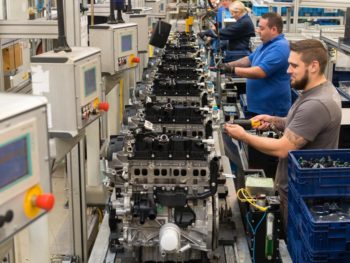Ford’s Bridgend engine plant to close in 2020
Ford has begun a consultation on the closure of its Bridgend engine plant in Wales, which could close by September 2020, risking the loss of 1,700 jobs.

The union for Ford workers in Bridgend, GMB, says Ford engine production is likely to be ultimately transferred to Mexico
Ford said in an official statement that its plan includes an employee separation programme, plus measures to help employees find new jobs or other career opportunities. The firm adds that it will remain a significant employer in the UK, maintaining engine production at Dagenham, as well as Dunton Technical Centre remaining its sales-leading commercial vehicle business.
However, the GMB union that represents workers in Bridgend said that engine production is likely to ultimately be transferred to a Ford manufacturing facility in Mexico.
GMB regional organiser Jeff Beck said: “It’s a real hammer blow for the Welsh economy and the community in Bridgend.
“Regardless of today’s announcement GMB will continue to work with Ford, our sister unions and the Welsh Government to find a solution to the issue and mitigate the effects of this devastating news.”
Ford is currently the UK’s No.1 brand in the first quarter of 2019 in terms of sales, spurred by phenomenal sales of its best-selling Fiesta supermini.
The news follows recent senior appointments, which were meant to facilitate Ford’s European Transformation Strategy. This saw Stuart Rowley move from chief operating officer for Ford North America to the role of president, Ford of Europe, to take on operational leadership of the business unit.
“Creating a strong and sustainable Ford business in Europe requires us to make some difficult decisions, including the need to scale our global engine manufacturing footprint to best serve our future vehicle portfolio,” said Stuart Rowley, “We are committed to the UK, however, changing customer demand and cost disadvantages plus an absence of additional engine models for Bridgend going forward make the plant economically unsustainable in the years ahead.”
“As a major employer in the UK for more than a century, we know that closing Bridgend would be difficult for many of our employees,” Rowley said. “We recognise the effects it would have on their families and the communities where they live and, as a responsible employer, we are proposing a plan that would help to ease the impact.”
Ford’s 60-acre Bridgend factory first began producing engines in 1980, three years after its construction had started. According to Ford’s website, the factory currently produces engines:
- 1.25-litre 4-cyl. – Fiesta
- 1.4-litre 4-cyl. – Fiesta, B-MAX
- 1.6-liter Ti-VCT – Fiesta, B-MAX, Focus, C-MAX, Grand C-MAX, Mondeo
- 1.6-litre EcoBoost – C-MAX, Grand C-MAX , Mondeo, S-MAX and Galaxys
Factors behind Bridgend’s closure include significant underutilisation of the plant, Ford said, driven by the impending end of engine production for Jaguar Land Rover (which operates a plant within a plant), the cessation of the previous-generation Ford GTDi 1.5-litre engine, and reduced global demand for the new-generation Ford GTDi and Pfi 1.5-litre engine.
Ford added that the plant’s production costs were more than that of other plants producing the same engines.

